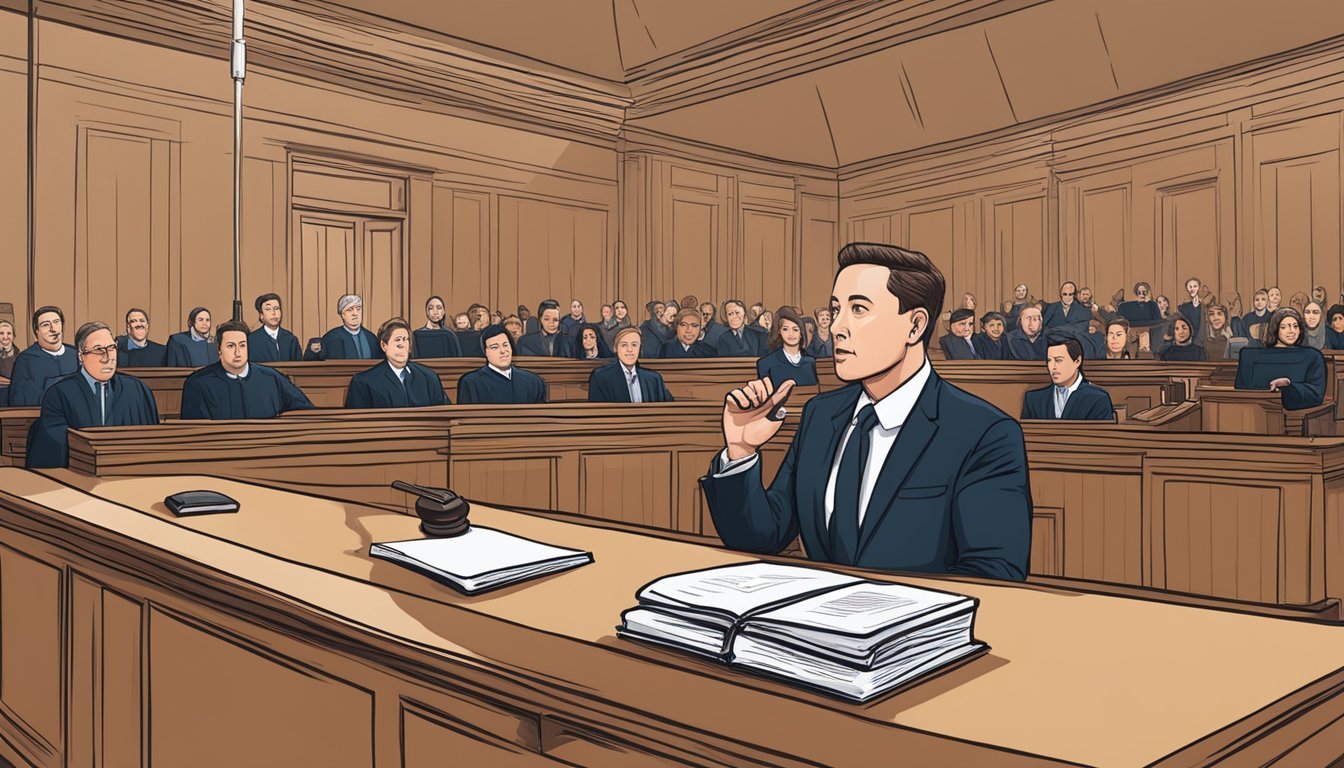Lemon Squeezes Musk: $35M Lawsuit Exposes Tech Titan's Shocking On-Camera Meltdown!
The clash between Don Lemon and Elon Musk has become a high-profile media spectacle. Lemon, a former CNN anchor, and Musk, the billionaire owner of X (formerly Twitter), engaged in a contentious interview that sparked controversy and led to unexpected consequences.
The interview between Lemon and Musk covered sensitive topics like hate speech, content moderation, racism, and antisemitism, resulting in tense exchanges and disagreements. Musk became visibly irritated during the conversation, asserting that he didn't have to answer questions from reporters, while Lemon challenged his views on various issues.
Following the interview, Musk abruptly canceled "The Don Lemon Show," a planned partnership for a talk show on X. This decision prompted Lemon to file a lawsuit against Musk and X, seeking over $35 million in damages for an alleged breach of contract. Musk denies the existence of any deal, dismissing Lemon's demands as "impressively insane."
Profiles of Key Figures
Don Lemon and Elon Musk are influential figures in media and technology. Their careers and public personas have shaped their roles in recent events.
Don Lemon: Career and Influence
Don Lemon built a prominent career as a CNN anchor and journalist. He gained recognition for his direct interviewing style and coverage of major news events. Lemon hosted "CNN Tonight" for several years, becoming one of the network's most visible personalities.
His influence extended beyond traditional news, as he often addressed social and political issues. Lemon's career faced a shift when CNN terminated his employment in 2023. This led to discussions about media representation and editorial decisions.
Following his departure from CNN, Lemon pursued new opportunities in digital media. He announced plans for "The Don Lemon Show" on Elon Musk's social media platform X. This move sparked interest in how established journalists might adapt to emerging media landscapes.
Elon Musk: Entrepreneurship and Controversies
Elon Musk is known for his roles as CEO of Tesla and SpaceX. His ventures have significantly impacted the automotive and space industries. Musk's acquisition of Twitter in 2022, later rebranded as X, marked his entry into social media ownership.
His leadership style and public statements have attracted both praise and criticism. Musk's approach to content moderation and platform policies on X has been a subject of debate. He has faced accusations of allowing misinformation to spread on the platform.
Musk's business decisions have sometimes led to legal challenges. His interactions with public figures and journalists on X have often made headlines. The platform's changes in advertising and content partnerships have affected its relationships with media companies and advertisers.
Interaction Between Media and Technology
The relationship between media and technology has evolved rapidly in recent years. Traditional news outlets face new challenges and opportunities in the digital landscape, while tech entrepreneurs seek to reshape information distribution platforms.
CNN's Role in the Digital Age
CNN has adapted its approach to news delivery in response to changing viewer habits. The network expanded its digital presence through websites, mobile apps, and streaming services. This shift aimed to reach audiences who increasingly consume news on smartphones and tablets rather than traditional cable TV.
CNN also experimented with new formats like virtual reality reporting and interactive data visualizations. These innovations sought to engage viewers in more immersive ways. However, the network faced criticism over concerns about sensationalism and bias in its coverage.
The rise of social media posed both opportunities and threats for CNN. While platforms like Twitter allowed for rapid dissemination of breaking news, they also enabled the spread of misinformation that challenged CNN's authority.
Musk's Vision for Social Media Platforms
Elon Musk's acquisition of Twitter, later rebranded as X, signaled his intent to reshape social media. Musk advocated for reduced content moderation and greater emphasis on free speech. This stance contrasted with policies of other major platforms that had increased efforts to combat misinformation and hate speech.
Musk implemented changes like introducing paid verification and altering algorithms that determine content visibility. These moves aimed to create what he described as a "digital town square" for open dialogue.
Critics argued Musk's approach could lead to increased spread of harmful content. Concerns arose about potential impacts on journalism, advertising, and public discourse. Musk countered that users should have more control over their feeds and be able to access a wider range of viewpoints.
The platform explored new revenue models beyond traditional advertising, including subscriptions and micropayments for content creators. This shift aimed to reduce reliance on ad revenue and give users more incentive to produce high-quality posts.
Legal and Ethical Considerations
The Don Lemon and Elon Musk dispute raises complex legal and ethical questions around business dealings, content moderation, and free speech in the digital age.
Lawsuits and Legal Battles
Don Lemon filed a $35 million lawsuit against Elon Musk, alleging fraud, negligent misrepresentation, and breach of contract. The suit stems from a failed deal for Lemon to produce an interview show on X, Musk's social media platform.
Lemon claims Musk enticed him into an agreement but abruptly terminated it before the pilot aired. The legal action accuses Musk of violating contractual obligations and damaging Lemon's professional reputation.
Musk has asked a federal judge to dismiss the lawsuit. His legal team argues the claims lack merit and that no binding contract existed between the parties.
Challenges in Content Moderation
X faces ongoing scrutiny over its content moderation practices. Critics argue the platform has become a breeding ground for hate speech and misinformation under Musk's leadership.
Musk's approach to content moderation emphasizes free speech, sometimes at the expense of controlling harmful content. This stance has led to controversies involving the spread of conspiracy theories and extremist ideologies.
The platform grapples with balancing free expression and responsible oversight. Advertisers have expressed concerns about brand safety, leading to revenue challenges for X.
Issues of Misappropriation and Defamation
Lemon's lawsuit alleges misappropriation of his name and likeness by Musk and X. This raises questions about the ethical use of a public figure's identity in business negotiations.
The dispute highlights potential reputational damage suffered by both parties. Lemon claims the failed deal harmed his professional standing, while Musk faces scrutiny over his business practices.
Accusations of defamation have emerged, with both sides making public statements about the other. This underscores the legal risks of public commentary during ongoing litigation.
Cultural and Political Impact
Elon Musk's interview with Don Lemon sparked discussions on various societal issues. Their conversation touched on contentious topics like immigration, politics, and media influence.
Influence on Political Discourse
Musk's comments during the interview gained significant attention in political circles. He addressed the Great Replacement Theory, a controversial idea about demographic changes. While not fully endorsing it, Musk's statements sparked debate on immigration policies and their potential impacts.
The tech mogul's political ideology shift during the COVID-19 pandemic became a focal point. His views on government regulations and individual freedoms resonated with certain political groups. This alignment influenced public opinion and policy discussions.
Musk's platform X (formerly Twitter) emerged as a key player in shaping political narratives. His ownership of the social media giant raised questions about the intersection of technology, free speech, and political power.
Media's Role in Shaping Culture
The Musk-Lemon interview highlighted the media's influence on cultural conversations. Their discussion touched on "woke culture" and its effects on society. This brought attention to ongoing debates about social justice and cultural change.
Media personalities like Lemon play a crucial role in framing these discussions. The interview's cancellation by X raised questions about media independence and corporate influence. It sparked conversations about the balance between platform ownership and journalistic freedom.
The incident underscored the power dynamics between tech leaders and traditional media. It demonstrated how high-profile interviews can shape public perception on complex issues. The event prompted reflections on the responsibilities of media figures and tech platforms in cultural dialogues.
Commercial Aspects and Partnerships
The commercial relationship between Don Lemon and Elon Musk's X platform involved a content partnership and advertising revenue plans. This collaboration aimed to leverage Lemon's media experience and X's user base for mutual benefit.
Advertising and Revenue Streams
X's partnership with Don Lemon was expected to generate significant advertising revenue. The platform planned to monetize Lemon's show through ad sales, targeting a diverse audience.
This strategy aligned with X's efforts to expand its content offerings and increase user engagement. Lemon's reputation as a well-known media figure was seen as a valuable asset for attracting advertisers.
The deal likely included revenue-sharing arrangements, though specific terms were not publicly disclosed. X's advertising model typically involves promoted posts and sponsored content.
Strategic Partnerships and Alliances
X's collaboration with Don Lemon represented a strategic move to enhance its content portfolio. The platform sought to diversify its offerings beyond user-generated posts and short-form videos.
Lemon's exclusive partnership was part of X's broader initiative to bring established media personalities to the platform. This approach aimed to boost X's credibility as a news and entertainment destination.
The alliance was designed to be mutually beneficial. X would gain high-quality, professional content, while Lemon would access X's large user base.
However, the partnership's abrupt termination led to legal disputes. Lemon filed a lawsuit in California, alleging breach of contract and fraud.
Conclusion
The Don Lemon-Elon Musk interview exposed tensions between journalistic inquiry and public figure defensiveness. Lemon's probing questions about content moderation on X clashed with Musk's vision for the platform.
This encounter highlighted the challenges of balancing free speech with responsible content policies on social media. Musk's responses revealed his stance on these issues, while Lemon pressed for clarity.
The interview's aftermath led to unexpected consequences. X canceled its partnership with Lemon shortly after the filming, raising questions about the relationship between platform owners and content creators.
This episode underscores the complex dynamics between tech leaders and media figures. It also demonstrates the potential impact of high-profile interviews on business decisions and public perceptions.
The Lemon-Musk exchange serves as a case study in the evolving landscape of digital media and free speech debates. It reflects broader societal discussions about the role of technology platforms in shaping public discourse.






